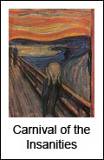Harsh words: but true
Source: guardian.co.uk/commentisfree/2008/aug/21/israelandthepalestinians.middleeast
People object to the wanton destruction meted out in [Palestinian] villages by the IDF being likened to pogroms - the word having been somehow arrogated by certain Jewish people for their exclusive use."
Seth Freedman
The Guardian (London)
August 21, 2008
At which point do absurd comparisons become blatantly offensive? The Guardian's Seth Freedman recently compared the western media to the Al-Aqsa television station. You need to realize just how perverse this station really is in order to fully grasp the absurdity of Freedman's comparison.
Here's a brief glimpse of Al-Aqsa TV, which was launched by Hamas in 2006 as part of its campaign to counter what it saw as Israeli propaganda in the western media. The station transmits news, documentaries, and children's programs from Gaza.
A Mickey Mouse lookalike character tells children that he will eat the Jews, and then sings "We will never recognize Israel", while a little girl joins in for the refrain: "Until we liberate our homeland from the Zionist filth."
A TV bunny is tempted by Satan to steal, and is sentenced by children viewers to be punished according to the Koran, by having his hand chopped off. He then threatens to kill the people of Denmark for the publication of a cartoon that illustrates the prophet Muhammad.
And in a particular potent strain of edification, Arab children are stuffed into a crematorium embellished with a nazi swastika and a Jewish Star of David, while for more mature viewers, a Hamas documentary program explains that it was the Jews who planned the Holocaust in order to kill other Jews who were handicapped.
The station's news broadcast reports that Israel is creating artificial earthquakes to shake the foundations of the Al-Aqsa mosque in Jerusalem, and in an interview with Agence France-Presse, the station's news manager, Ibrahim Daher, explains: "We adapt news so that it is compatible with our culture, the values of our people, and Islam".
Freedman recently summarized his impressions of the television station after having spent some time with a Palestinian family in the West Bank watching the news with two of his host's sons.
He implies that there is a balance of bias between the way the supposedly pro-Israel media disseminates information from the Middle East and the way Hamas television reports its version of events. He states: "The abandoning of western media parlance... in favor of an entirely different lexicon was a rude awakening for me, having been fed on a vastly different diet over the years." (Freedman is a fairly recent immigrant to Israel from Britain.)
Freedman sees an equitable parallel between the Hamas broadcasts on the one hand and the Israel and Western media (he combines the two) on the other; they are basically two sides of the same coin. "...it would be "wholly understandable" if a viewer of al-Aqsa TV who tuned into any western station from the BBC to Sky News and beyond felt a mirror-image outrage simply because of the terms used to describe the conflict."
And regarding the news broadcast that he was watching with his host's sons, he adds, "...the terms used ...were indicative of how wide the gulf is between ordinary citizens "on either side of the divide".
Freedman's lengthy introduction leads up to his main point: the vocabulary that is used to describe the Israeli-Palestinian conflict is always unavoidably offensive to one side and acceptable to the other, due to the sides' different perspectives of the conflict. Thus, whenever Freedman tries "to call a spade a spade" he inevitably finds himself under fire from one side or the other. (Of course in his case the fire almost exclusively come from the Israeli side, because he rarely, if ever, has anything good to say about his newfound homeland.)
Freedman gives examples of his difficulty in calling a spade a spade. According to Freedman, the Palestinians are upset with the use of the terms settlers instead of colonists, and the Israel Defense Forces (IDF) instead of the more appropriate (according to Freedman) Israel Occupying Forces.
On the other hand, Israelis are upset with the term apartheid despite it being the more appropriate term for the situation in the West Bank (according to Freedman), and with the term pogrom to describe the destruction by the IDF in Palestinians villages, which is a term that Freedman believes has been "arrogated by certain Jewish people for their exclusive use, and only then in relation to the Jews' own historical suffering." (Freedman is apparently unaware that the term 'pogrom' entered English from Yiddish/Russian where it described the carnage of Jews in Eastern Europe.)
By his defense of these egregious descriptors, Freedman has set himself up as an apologist for the excesses of the Al-Aqsa station. In particular, his attempt to explain away the sensitivity of Israelis towards the careless use of the term 'pogrom' is inexcusable, considering that as a Jew and an Israeli he cannot claim ignorance.
Freedman concludes with one of his more remarkable statements. "While I understand how emotionally invested people (myself included) become when focusing on the conflict," he says, "we should not allow a situation where plainly-spoken facts are dismissed simply because the reader or viewer feels uncomfortable with the truth." In other words, those who reject the use of descriptors such as apartheid, Israel Occupying Forces, and pogroms, are clearly doing so because they are "uncomfortable with the truth". The possibility doesn't even enter Freedman's mind that they are rejecting these terms because they are uncomfortable with falsehoods.
While Freedman's most extreme allegations have been omitted here, he himself is a living rebuttal to his own claims. In Israel, he can call a spade a spade whenever he wishes; in fact he can even call it a pogrom. This is one of the benefits of living in a free society, - a privilege certainly not afforded by Hamas to the Gaza viewers of Al-Aqsa TV.
























